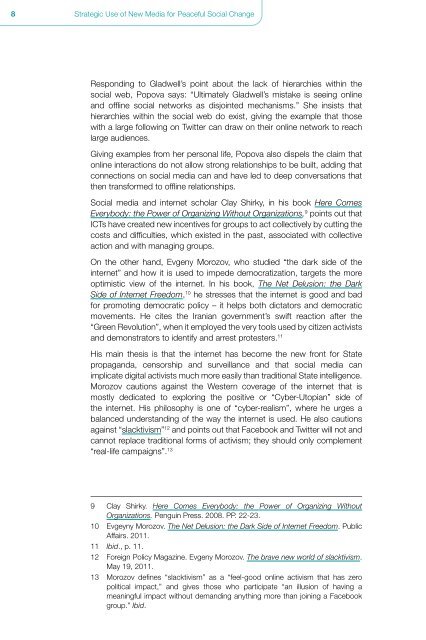Strategic Use New Media Peaceful Social Change
1Uy7LZ0
1Uy7LZ0
Create successful ePaper yourself
Turn your PDF publications into a flip-book with our unique Google optimized e-Paper software.
8<br />
<strong>Strategic</strong> <strong>Use</strong> of <strong>New</strong> <strong>Media</strong> for <strong>Peaceful</strong> <strong>Social</strong> <strong>Change</strong><br />
Responding to Gladwell’s point about the lack of hierarchies within the<br />
social web, Popova says: “Ultimately Gladwell’s mistake is seeing online<br />
and offline social networks as disjointed mechanisms.” She insists that<br />
hierarchies within the social web do exist, giving the example that those<br />
with a large following on Twitter can draw on their online network to reach<br />
large audiences.<br />
Giving examples from her personal life, Popova also dispels the claim that<br />
online interactions do not allow strong relationships to be built, adding that<br />
connections on social media can and have led to deep conversations that<br />
then transformed to offline relationships.<br />
<strong>Social</strong> media and internet scholar Clay Shirky, in his book Here Comes<br />
Everybody: the Power of Organizing Without Organizations, 9 points out that<br />
ICTs have created new incentives for groups to act collectively by cutting the<br />
costs and difficulties, which existed in the past, associated with collective<br />
action and with managing groups.<br />
On the other hand, Evgeny Morozov, who studied “the dark side of the<br />
internet” and how it is used to impede democratization, targets the more<br />
optimistic view of the internet. In his book, The Net Delusion: the Dark<br />
Side of Internet Freedom, 10 he stresses that the internet is good and bad<br />
for promoting democratic policy – it helps both dictators and democratic<br />
movements. He cites the Iranian government’s swift reaction after the<br />
“Green Revolution”, when it employed the very tools used by citizen activists<br />
and demonstrators to identify and arrest protesters. 11<br />
His main thesis is that the internet has become the new front for State<br />
propaganda, censorship and surveillance and that social media can<br />
implicate digital activists much more easily than traditional State intelligence.<br />
Morozov cautions against the Western coverage of the internet that is<br />
mostly dedicated to exploring the positive or “Cyber-Utopian” side of<br />
the internet. His philosophy is one of “cyber-realism”, where he urges a<br />
balanced understanding of the way the internet is used. He also cautions<br />
against “slacktivism” 12 and points out that Facebook and Twitter will not and<br />
cannot replace traditional forms of activism; they should only complement<br />
“real-life campaigns”. 13<br />
9 Clay Shirky. Here Comes Everybody: the Power of Organizing Without<br />
Organizations. Penguin Press. 2008. PP. 22-23.<br />
10 Evgeyny Morozov. The Net Delusion: the Dark Side of Internet Freedom. Public<br />
Affairs. 2011.<br />
11 Ibid., p. 11.<br />
12 Foreign Policy Magazine. Evgeny Morozov. The brave new world of slacktivism.<br />
May 19, 2011.<br />
13 Morozov defines “slacktivism” as a “feel-good online activism that has zero<br />
political impact,” and gives those who participate “an illusion of having a<br />
meaningful impact without demanding anything more than joining a Facebook<br />
group.” Ibid.


